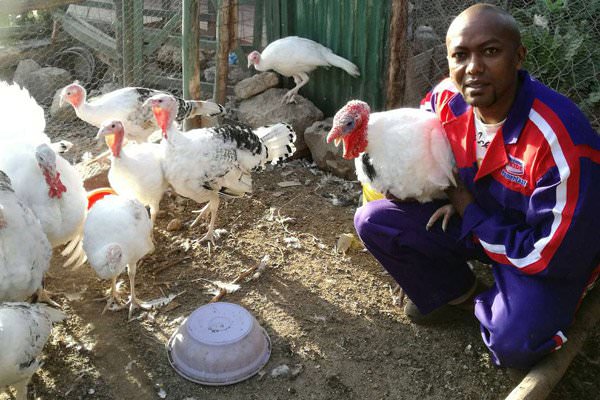“It started when I was a young boy.
My parents kept a few turkeys and I was always fascinated by them. I liked their imposing looks and how they would spread their wings. They were very beautiful and I knew I would keep them one day. But I remember they all died and my parents never kept them again,” says Ben Kithinji.
Then in 2015, he visited a farm in Limuru with his two daughters. “The farm kept turkeys and my daughters said they wanted to have them. I bought them and took them home to Mlolongo as pets for ornamental purposes,” he says.
Shortly thereafter he realized there was no looking back. His childhood dream had returned and he was no longer content with just rearing the birds as a hobby.
He was going to establish a turkey breeding and meat selling business.
He started by constructing a simple poultry structure, which cost him about Sh5,000. He also purchased feeding trays and drinkers.
“The initial birds cost me Sh24,000,’’ says Kithinji, whose wife, Grace, and daughters, assist him in taking care of the birds.
He says he started with six turkeys – three pure white and three royal palm breeds – which he sourced from Ndeiya farm, Limuru, through a referral from Daily Nation.
On his one-eight acre plot, Kithinji has reserved a corner, where he keeps the birds. The area can hold over 100 birds,’’ he reveals.
BOOST FARMING ACTIVITIES
He feeds the birds using chick mash (Unga or Pembe) when they are young, growers mash up to four months and a mixture of commercial mash and kienyeji mash, from Economy Farm Products.
“I also give them maize seeds, kitchen waste and greens which I get regularly from local vegetable suppliers. I also allow them to free range within the compound,’’ adds Kithinji.
He says turkeys consume more than chickens but grow at a faster rate. He adds: “Turkeys are also delicate and require tender care. They are beautiful to watch and are wary about strangers, so they guard the compound.’’ In a quest to ensure he boosts his farming activities, Kithinji does research.
“I did a lot of research and still do. I visit as many expos as possible, including Agritech Expo at KICC.
“Seeds of Gold is a must and I have volumes of them that I refer to. Through research, I have specialized in pure white and royal palm breeds. White turkeys have whiter and leaner meat which is less fatty and has a greater delicious flavour.’’
He sells the birds when they are over three months old; when they are strong and stable. “This is to reduce the possibility of the birds getting sick when new owners acquire them. I do not sell the eggs and prefer hatching them. We also love eating them,’’ he says.
COST OF FEEDS
He adds that he sells the turkeys at different prices depending on a number of factors such as age, breed and sex. He says a ready to lay female costs Sh3,500, whereas, a mature male costs Sh5,500. A laying female, he reveals, sells at Sh5,000.
The farmer, who works in the financial sector in Nairobi, says that he does not have employees. “This is a family hobby and we enjoy doing the work ourselves after school/work.’’
The biggest challenge, he says, is the cost of feeds. “Maize prices have gone up and so is the cost of feeds. During dry spells the cost of greens skyrockets too. I am already making arrangements to attend courses in feeds formulation, so we do it ourselves. The other is the modalities of importing young chicks from other countries as I would like to improve on the breed,’’ says Kithinji, adding that he pays very close attention to avoid diseases.
He has lost only one bird in two years, due to fowl pox. However, he says that he quickly controlled it before it spread. Apart from that, he deworms the turkeys regularly and vaccinates them as well.
He says that he gets customers from various areas such as Nairobi, Mombasa, Nakuru and Embu. Apart from selling the birds, Kithinji also sells their meat. He sells the meat at Sh700 per kg.
“On weekends we sell about 10kg of meat and more than 10 turkeys monthly, depending on availability. Last week, we sold about 25.’’ He had about 50 turkeys during the interview.









